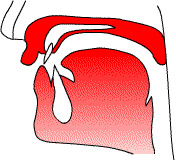 As we grow older our teeth and gums deteriorate. When I was young I used to be able to make labiodental plosives, [p̪ b̪] — but I can’t now. I can no longer get a hermetic seal between my lower lip and upper teeth: there’s always some escape of air through the gaps between my teeth.
As we grow older our teeth and gums deteriorate. When I was young I used to be able to make labiodental plosives, [p̪ b̪] — but I can’t now. I can no longer get a hermetic seal between my lower lip and upper teeth: there’s always some escape of air through the gaps between my teeth.This is no doubt one of the reasons that no language has distinctive labiodental stops.
It means that when I try to make [ɱ], as in information or emphasis, I end up with some sort of [ṽ]. Inevitably some air escapes through the mouth.
What this is leading up to is that I used to think that I would usually pronounce seventy as [ˈseɱnti] (with the alveolar nasal somewhat dubious). I am sure plenty of other people still do. But what I now say is [ˈseṽnti]. And that must have been an intermediate stage in my previous nasal-assimilated pronunciation.
Underlyingly it’s still ˈsevənti, and always has been.





I've always (well, since my permanent teeth came in) had gaps between my incisors, so the only such monstrosities I can achieve are labio-alveolar stops. The trouble with these, however, is that I get beard hairs caught in my teeth.
ReplyDeleteThank you for such a randomly interesting post. This kind of things is why I love phonetics so much!
ReplyDeleteI've always heard that we're able to produce all sounds of human speech when we're born. And we lose that ability as we grow old...
ReplyDeleteMaybe that's the explanation.
Warm regards
"I've always heard that we're able to produce all sounds of human speech when we're born. And we lose that ability as we grow old."
ReplyDeleteWhat we are born with is the potential to produce all sounds. A baby cannot, physically, do much more than say 'a'. When our mothertongue is engrained into our brains and, through muscle memory, into our tongue and lips, it is difficult to learn to speak and discern sounds that are either subtly different (e.g. the distinction between Polish sz and ś) or wildly so (e.g. all types of clicks).
This has, however, nothing to do with the deterioration of the physical condition, as Mr. Wells described.
Reminds me of what one of my professors told me. He was fieldworking on a neo-Aramaic lanugage, but the old man they interviewed had lost all of his teeth, so they had difficulties with the dentals and sibilants. The problem was that he was the last surviving speaker. (His daughter understood the language, but didn't hear well.)
ReplyDeleteIsn't seventy normally pronounced /ˈsevn̩ti/ (syllabic diacritic below 'n')?
ReplyDeleteThis comment has been removed by the author.
ReplyDelete